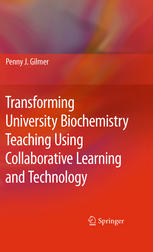

Most ebook files are in PDF format, so you can easily read them using various software such as Foxit Reader or directly on the Google Chrome browser.
Some ebook files are released by publishers in other formats such as .awz, .mobi, .epub, .fb2, etc. You may need to install specific software to read these formats on mobile/PC, such as Calibre.
Please read the tutorial at this link: https://ebookbell.com/faq
We offer FREE conversion to the popular formats you request; however, this may take some time. Therefore, right after payment, please email us, and we will try to provide the service as quickly as possible.
For some exceptional file formats or broken links (if any), please refrain from opening any disputes. Instead, email us first, and we will try to assist within a maximum of 6 hours.
EbookBell Team

4.1
90 reviewsOne aim of Gilmer’s captivating text on university pedagogy is to show that biochemistry (or any science) does not consist solely of facts to be learned, but is a way of thinking about the world. Her purpose, both in this book and in her classroom, is to make her students into critical thinkers rather than passive learners. The chapters cast a critical eye over research into enhanced education techniques such as collaborative learning. Gilmer describes the action research she conducted in her own biochemistry undergraduate classroom into ways of improving the learning environment. She offers various perspectives on the make-up of her classroom, including an analysis of ethnographic data.
The tools Gilmer employs as she hones her teaching skills include collaborative learning and technology. She views the classroom through various theoretical perspectives: social constructivism, cultural-historical activity theory, and a theory that involves the dialectic between the structure of the learning environment and the agency of the learners (a group among whom she includes herself). She provides a wealth of autobiographical detail as well as the results of her action research, which followed up on its original subjects after an interval of 11 years, to see what impact her course had on their professional growth. Above all, this volume is proof of what can be achieved in education when teachers are as interested in the process of learning as they are in their subject itself.